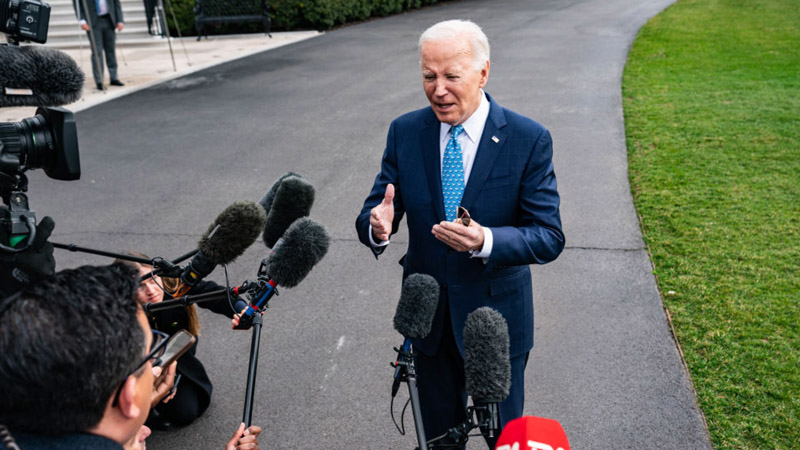Currently, the reporting consensus seems to be that Biden will order major strikes against various Iranian ‘proxy’ positions especially in Iraq and Syria.
A “decision” has been made, apparently, with CBS reporting: “Biden tells reporters that he has decided on how to respond to the attack that killed US troops in Jordan.” And Sky News writes, ‘Moment of no return approaching’ as Biden weighs retaliation for soldier deaths.
Additionally, Biden said the White House sees Iran as responsible for supplying the weapons used in the drone strike on the Tower 22 base along the Jordan-Syria border, an attack which also saw over 40 American troops injured.
Admin officials have repeatedly asserted they do not seek wider war with Iran, even while direct accusations fly against Tehran, and there’s talk of military ‘options’ and warlike threats go over the airwaves.
…because “pressure,” writes Bloomberg: “US President Joe Biden faces intensifying pressure to confront Iran directly after the country’s proxies killed three American soldiers in a drone strike in Jordan over the weekend, risking precisely the wider regional conflict that he’s trying to avoid.”
“A person familiar with the US position, who asked not to be identified discussing private discussions, said it was clear that a strike — which also wounded at least 34 — would force a stronger response than what the US has done so far in the weeks,” continues Bloomberg.
Currently, the reporting consensus seems to be that Biden will order major strikes against various Iranian ‘proxy’ positions especially in Iraq and Syria. In the immediate aftermath of the Sunday drone attack on the US Tower 22 base, there were reports that Iran-aligned militias were temporarily evacuating bases in the region.
Biden on the White House lawn Tuesday: “I do hold them [Iran] responsible in the sense that…
BREAKING: President Biden says he has made a decision on how to respond to the drone attack in Jordan and that he holds Iran responsible. pic.twitter.com/uR1Jhdzy03
— MSNBC (@MSNBC) January 30, 2024
US and coalition forces could at the same time launch another major round of airstrikes against Houthi positions in Yemen, amid continued targeting of Red Sea shipping.
The only question that remains is timing… when will the bombs fly? At this point it’s a certainty. A proverbial “moment of no return” is fast approaching. Historians could look back on this pivotal moment and see it as the point at which the Gaza war spiraled into a broader Middle East enduring conflict.
Tragic as any loss of American life is, one regional analyst points out the following sure to be unpopular truth…
If you’re a superpower that can’t suffer an average rate of one dead soldier per 38 days of intense regional conflict without behaving like you’ve arrived at a 9/11-type decision point, maybe massive military entanglements in the Middle East are not for you?
This gets at an asymmetry between the U.S. and its regional adversaries that advantages the latter, and regularly frustrates U.S. efforts to establish deterrence: these groups are weaker, but they have a sky-high pain tolerance.
They’re from here! They have people ready to die! https://t.co/9hmm7Gq77P
— Sam Heller | سام هيلر (@AbuJamajem) January 30, 2024
Meanwhile, Iranian Foreign Ministry spokesman Nasser Kanaani has denied that Tehran was behind the drone strike and killing of Americans: “As we have clearly stated before, the resistance groups in the region are responding [to] the war crimes and genocide of the child-killing Zionist regime and… they do not take orders from the Islamic Republic of Iran,” he said.
He further asserted: “These groups decide and act based on their own principles and priorities as well as the interests of their country and people.”
* * *
Below is some commentary on the ‘dilemma’ from Rabobank…
Let’s then start Blinken – which is that the US is doing when the US Secretary of State states, “The response against Iran could be multi-levelled and come in stages and be sustained over time.” Operation Praying Mantis, where the US sank half the Iranian fleet in a day in the 1980s, it won’t be: Operation Praying Man, ‘tis. Because while the White House counts its dead, injured and loss of deterrence at the hands of Iran-backed forces –as Tehran says it didn’t do it– it’s also counting the cost of a war that would not only not be over by the 2024 election, where higher oil prices would likely mean Biden loses, but might still be going on in 2028.
Markets will therefore be relieved as Bloomberg, both accurately and ridiculously, says the US aims to find a way to bomb Iran just enough to show it’s angry without doing real damage – so ‘politesse’, not real politics. But risks remain: bomb too much – war; bomb too little – more Iran pushback until we trigger that same war; and it’s not clear if there is a sweet-spot between the two.


